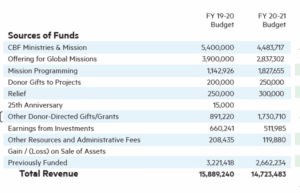More details released Oct. 13 about the Cooperative Baptist Fellowship’s 10% reduction in budgeted expenditures for the new fiscal year indicate a loss of 10 staff positions at the Decatur, Ga., offices and additional savings from normal attrition of missions personnel due to retirement.
The CBF website currently lists 36 CBF staff in the Decatur headquarters, not including CBF Foundation staff.
“In order to reach the balanced budget, we had to reduce overall spending by $1.6 million. That included the really difficult decision that we had to reduce CBF’s Decatur workforce by a total of 10 positions,” said Paul Baxley, executive coordinator, in a video call with CBF leadership Oct. 12.
“That is the most grief-filled, challenging part of preparing this budget.”
“That is the most grief-filled, challenging part of preparing this budget,” he said, adding the 10 staff members who are losing positions are “exceptionally gifted followers of Jesus who have … served with distinction.”
Names and positions affected by this reorganization will be released at a later date, he said, because those employees are being given time to make their own announcements to family and friends first.
In a subsequent interview, Baxley explained that the Decatur staff will experience a larger reorganization to facilitate implementation of the Toward Bold Faithfulness strategic plan. Even those staff members who remain may be asked to take on changes in job descriptions. Conversations about those structural changes are ongoing, he said, to allow staff input.
Global missions commitment
CBF will retain its commitment to global missions as a keystone of its work, Baxley said.
Although the budget overview shows a reduction of $500,000 in Global Missions field personnel salaries and benefits, that will not be achieved by laying off any missionaries, he explained. Instead, it already has been achieved by voluntary retirements that have taken place since the previous budget was adopted and by a few upcoming retirements.
The amount budgeted for field personnel compensation in the new budget — $3.4 million — reflects actual spending, he said. “There have been no forced reductions in our field personnel to meet this budget.”
At the same time, those who care about global missions need to understand that in the last six or seven years, the number of field personnel supported by CBF Global Missions has been cut in half.
The new budget accounts for 64 field personnel serving in 18 countries, said Steven Porter, coordinator for global missions.
A new missions funding model adopted by CBF two years ago ensures that appointed field personnel will receive salary and benefits through the Offering for Global Missions. Field personnel raise additional support from their own networks to fund their programs.
Such support increasingly has come from direct relationships between field personnel and local congregations through a system dubbed Encourager Churches. This program has been the single most successful component of missions giving in recent years, Baxley explained.
“Those relationships are powerful,” he said. “They invite congregations into a mission somewhere else in the world they could not have on their own. And they’re also powerful because our field personnel are resources to congregations in return.”
Offering for Global Missions
Notably, the new 2020-2021 budget shows a 27% reduction in anticipated revenue from the Offering for Global Missions, from $3.9 million to $2.8 million. As recently as three years ago, the CBF Global Missions Council was pushing for a $4 million annual goal for the offering.
The new 2020-2021 budget shows a 27% reduction in anticipated revenue from the Offering for Global Missions.
The new number reflects the reality of this unique year, Baxley said, and it is based on actual receipts for the year just ended. “The $2.8 million target is a very conservative target based on where we think we’re going to finish.
“But this is not a normal fall for the Offering for Global Missions either,” he added, explaining that COVID-19 shut down in-person worship last spring just at the time many churches would have been promoting the offering. And now as fall approaches, when other churches normally would be preparing publicity for year-end mission offerings, they are instead preoccupied with figuring out how to resume in-person worship safely.
Part of the staff reorganization under way now will place greater priority on promoting the offering, Baxley said. “The Offering for Global Missions is the life blood of our long-term presence.”
Other missions areas
Support for global missions rated high in the Toward Bold Faithfulness survey data, but other specific missions projects ranked high too. Among those is Together for Hope, which addresses persistent rural poverty in the United States and has been funded by a grant from the Eula Mae and John Baugh Foundation.
Also left largely intact are the Student.go and Student.church programs that place college and seminary students in short-term mission and ministry assignments particularly in the summer months.
Other aspects of CBF’s work with young adults, such as seminary scholarships and the CBF Fellows program, will continue as before.
Church starting pause
Church starting represents the largest shift in missional funding for the new budget although CBF doesn’t classify church starting within its Global Missions division.
Apart from the personnel budget, program funding for church starting is slated to drop from $156,000 to $85,000.
“While CBF global will absolutely continue to honor all the terms of (current) church starter relationships, we are putting a pause on commissioning any new church starters while we assess our approach to church starting,” Baxley said.
Diversity and advocacy
Within the new budget, some areas will receive additional funds and emphasis. Among those are work related to diversity and Christian advocacy — separate yet related initiatives.
The budget line labeled “racial justice and leadership” increased from $96,520 to $179,460.
“What is clear from the discovery process is there is a desire for diversity that is primarily about race and ethnicity but not exclusively,” Baxley said. “This emerged loud and clear and above others.”
“Our calling to diversity is about the heart of our faith, it’s about the gospel, it’s about the Scriptures.”
He told the group of CBF leaders Oct. 12: “Our calling to diversity is about the heart of our faith, it’s about the gospel, it’s about the Scriptures. The work of becoming more diverse is not just about cultural responsiveness in the present moment.”
Two years ago, CBF launched the Emmanuel McCall Racial Justice and Leadership Initiative, which includes an endowment that will provide supplemental funding for diversity initiatives and racial justice work.
Correspondingly, CBF’s established work in advocacy on social issues including but reaching well beyond race will grow. Baxley reported that “84% of those responding to the Toward Bold Faithfulness survey said the church should find a voice of matters of social need.”
CBF recently published a resource book titled The Mission of Advocacy that offers nearly 300 pages of practical guidance on advocacy, from how to contact officials to how to teach and preach about various social issues.
Collaborative ministries
Toward Bold Faithfulness calls CBF into greater partnership work, Baxley said in a previous interview. That will represent increasing collaboration with partner entities — a loose network of nonprofit ministries with connections to CBF, which includes BNG — as well as a newly defined role as a “convener” of important conversations.
“CBF as a community is bigger than CBF in Decatur,” he said. “We need to partner with others in the CBF family.”
The convening role could mean leveraging CBF’s network of relationships to call together individuals, congregations and organizations within CBF life and beyond CBF life to work together on important issues, Baxley said.
State and regional organizations
The universe of CBF’s life includes not only the primary unit, often referred to as “CBF global” but a network of 19 state and regional organizations that are autonomous yet supportive of the whole. Some of those organizations are large and well-funded, and others are small and operate on a shoestring.
A recent 25th anniversary endowment campaign created a series of block grants over the course of three years to support ministry in states and regions. In the last year of these grants, $600,000 is budgeted to support such ministry.
Congregational resourcing is one area where state and regional organizations might better serve congregations than CBF global, Baxley explained. “We are going to seek a much more open collaboration with states and regions about how best to serve congregations. State and regional leaders have access to ongoing relationships to congregations … that is hard to have from a global office. They are first responders. There are some things they are uniquely equipped to do. And there are some things a global organization is better equipped to do.”
Revisiting relationships with state and regional organizations will not involve a one-size-fits-all strategy, he added. “We are committed to an even more collaborative partnership.”
Other budget details
 In addition to a projected reduction in giving through the Offering for Global Missions, the new budget projects a $916,283 (16.9%) decrease in undesignated giving from churches and individuals. The previous year’s budget was $5.4 million, and the new budget is $4.48 million.
In addition to a projected reduction in giving through the Offering for Global Missions, the new budget projects a $916,283 (16.9%) decrease in undesignated giving from churches and individuals. The previous year’s budget was $5.4 million, and the new budget is $4.48 million.
On the other hand, the new budget projects increases in designated missions programming gifts, donor-directed gifts to special projects, disaster relief work, and grants. The grants category shows a significant increase because of a newly announced $1 million grant from the Lilly Endowment for a “thriving congregations” initiative. CBF currently is managing the final years of two other Lilly grants.
CBF’s fiscal year began Oct. 1. The new budget projects total available revenue from all sources of $14,723,483, compared to $15,889,240 in the year just ended. The gap between planned expenditures and actual expenditures in the prior year is wider than this shows, however, because of a one-time authorization to spend from reserve funds in the prior year.
The 2020-2021 budget is a balanced budget, said Mike Oliver, pastor of Trinity Baptist Church in Madison, Ala., and a member of the CBF Governing Board and Finance Committee.
He described the new spending plan as “a conservative budget that lives into our commitments” without relying on reserves and yet “remains very strongly committed to global missions.”
“This provides us a sustainable path forward,” he said. “This is a very hopeful future. It means CBF has a bright future.”
Related articles:
CBF Governing Board will consider significant budget changes this week
CBF Governing Board adopts strategic plan along with budget reduction for 2021


